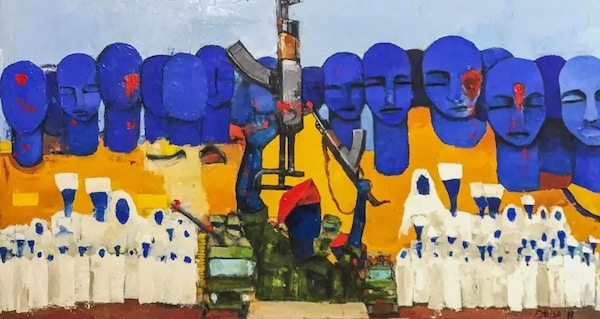Dear friends,
Greetings from the desk of Tricontinental: Institute for Social Research.
Over the past weeks, international focus has no doubt been on the escalation between India and Pakistan, which we will write more about once the dust settles. Though none of the armies crossed the border or the Line of Control, concern is nonetheless understandable: both countries wield nuclear weapons in their arsenal. Now, there has effectively been a return to the ceasefire of 1948, which has lingered in the decades since without a proper and full peace treaty. International attention has also rightly remained on the genocide in Palestine, with Israelis tightening the total siege on Gaza, perhaps as vengeance for Palestinians’ return to northern Gaza on 27 January 2025 in total defiance of the genocidal war.
Meanwhile, some conflicts, like the ongoing war in Sudan, have been almost utterly forgotten. That is the focus of this newsletter, built through conversations with humanitarian workers and Sudanese political figures. The argument that this war is bewildering and that there are no easy explanations for it is a reflection of the racism of our reportage that sees conflicts in Africa as inexplicable and interminable. There are, of course, causes for the war, which means that there are ways for it to end. One must set aside the language of blood that has gripped our world and find instead the political details within which reside the possibility of peace.
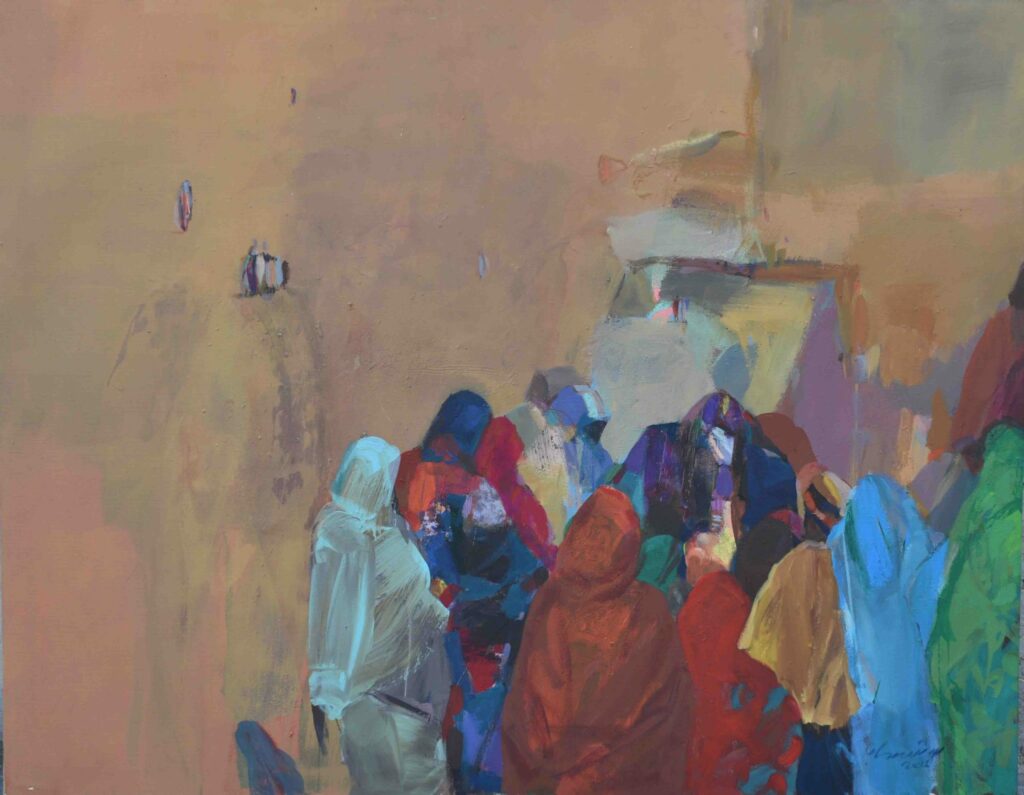
Rashid Diab (Sudan), Untitled, 2016.
Two years ago, the fragile but hopeful peace in Sudan was broken when the Sudanese Armed Forces (SAF) and the Rapid Support Forces (RSF)—both arms of the Sudanese state—went to war with each other. The second anniversary of this war was commemorated on 11 April 2025 with a ghastly RSF attack on the Zamzam refugee camp in North Darfur. As Hawa, a mother of three who survived the attack, recounted, ‘bombs were falling on the hospital… Those of us who survived left with only our children on our backs’.
By 16 April, the camp—which had once housed half a million refugees—was destroyed, leaving hundreds dead and the rest to flee to nearby El Fasher and Tawila. In two years of fighting, at least 150,000 people have been killed and nearly 13 million—over one fifth of Sudan’s population of 51 million—displaced. This ongoing catastrophe appears utterly senseless to most Sudanese people.
Everything appeared differently on 11 April 2019, six years before the Zamzam massacre, when longtime President Omar al-Bashir was deposed by a mass movement and, eventually, the military. The protests against al-Bashir’s government first began in December 2018 over inflation and an escalating social crisis. Unable to answer to the people, al-Bashir could not sustain his rule—even by force—particularly when the Sudanese military turned against him (as the Egyptian military had turned against their country’s president, Hosni Mubarak, in 2011). Al-Bashir was overthrown by what later became known as the Transitional Military Council, led by General Abdel Fattah al-Burhan with the assistance of Lieutenant General Mohamed ‘Hemedti’ Hamdan Dagalo.
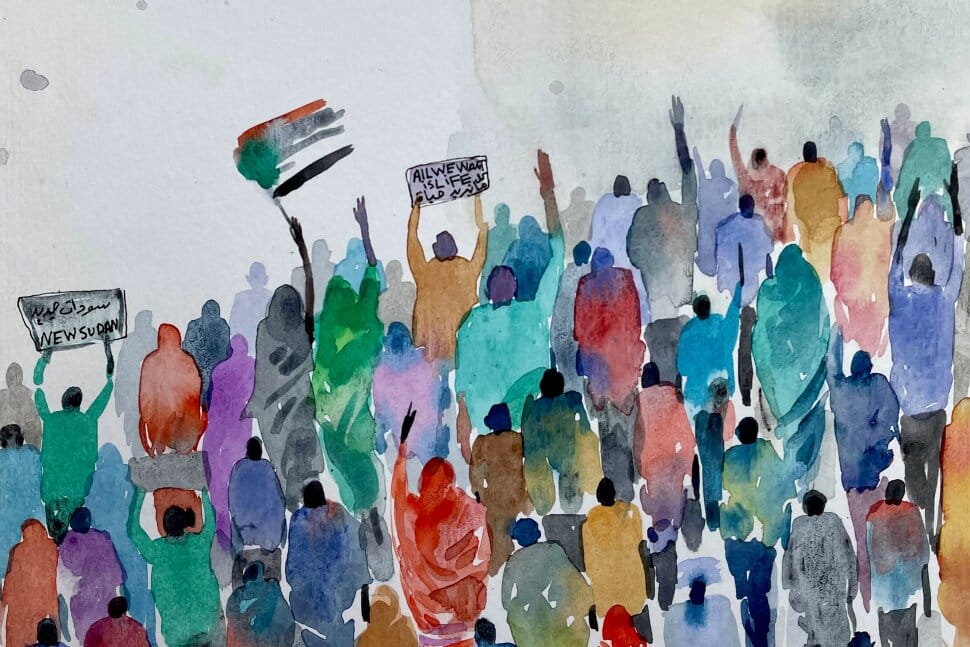
Galal Yousif (Sudan), A Peaceful Revolution, 2021.
The groups that led the protests on the ground formed a coalition called Forces for Freedom and Change (FFC). The FFC included the Sudanese Communist Party, National Consensus Forces, Sudanese Professional Association, Sudan Revolutionary Front, Women of Sudanese Civic and Political Groups, and many Sudanese resistance or neighbourhood committees. Pressured by FFC-led protests, the military signed an agreement in mid-2019 to oversee a transition to a civilian government.
With the assistance of the African Union, the Transitional Sovereignty Council was set up, composed of five military and six civilian members. The council appointed Abdalla Hamdok (born in 1956) as the new prime minister and Nemat Abdullah Khair (born in 1957) as the chief justice. Hamdok, a quiet diplomat who had done very important work at the Economic Commission for Africa, seemed well suited for his role as a transitional prime minister. Khair, a lifelong judge who joined the protest movements against al-Bashir, struck the right tone as a competent head of the judiciary. The door to a new future seemed to open for Sudan.
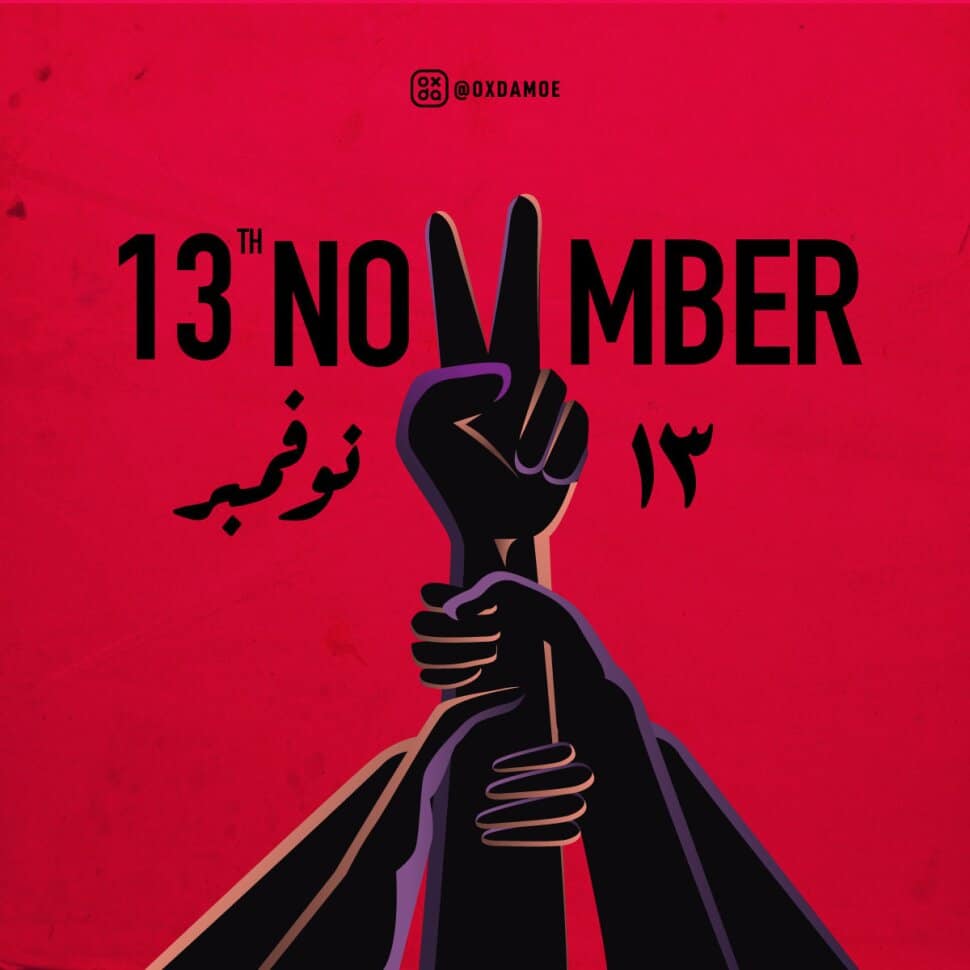
Abu’Obayda Mohamed (Sudan), March of Millions, 2021.
But, before long, Sudan fell prey to the pressures of its own history. In 2021, after several failed coups, General Abdel Fattah al-Burhan took power, ostensibly to defend the transition but in reality to bring in al-Bashir’s people back from isolation and into government. Revolutions are frequently interrupted by returns of the old regime, whose grip on the armed forces and on society is never so easily shrugged off. The two military men—al-Burhan and Hemedti—knew that any pursuit of justice against the government of al-Bashir would strike them hard, since they had been the hammer of his regime (Hemedti’s forces, known colloquially as the Janja’wid—or ‘devils on horseback’—were implicated in human rights violations during al-Bashir’s campaign in Darfur). Equally importantly, the two men and their coterie had material interests at stake, including control over the Sudanese gold mines in Darfur and Kordofan.
With men such as these, fear of the gibbet and hunger for greater bounty are paramount. A genuine transfer of power requires a complete break with the old society, which is difficult to achieve unless the military collapses or is thoroughly reconstructed in the image of the new society rather than with the elements of the old. Both al-Burhan and Hemedti pushed against this transition and—with swift repression against the mass movements, especially trade unions and communists—secured power in Khartoum.
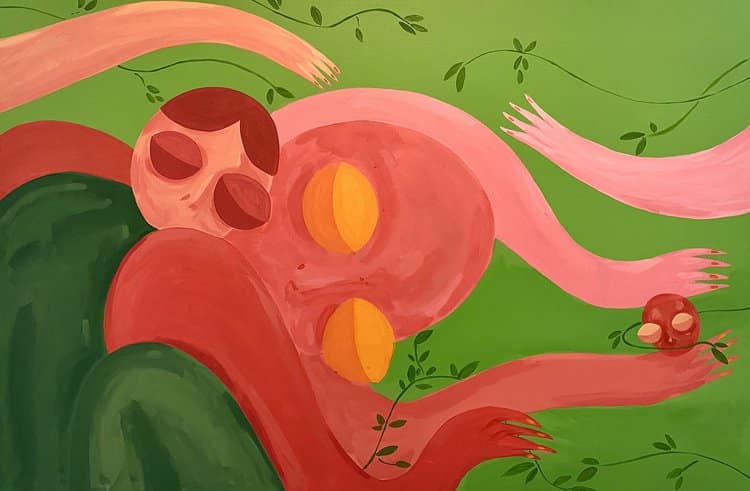
Reem Aljeally (Sudan), Entwined, 2022.
When a gaggle of ruffians forms a group for any country, it should worry all its people. In 2021, Saudi Arabia, the United Arab Emirates, the United Kingdom, and the United States formed the ‘QUAD for Sudan’ with the alleged purpose—they announced—of returning the country to democracy. Sudan sat on the knife’s edge of geopolitical intrigue as accusations began to fly about how the counter-revolutionary military in Sudan had begun to develop close relations with Russia. In 2019, al-Bashir discussed a deal that would have allowed Russia to build a naval base on the Red Sea, which would have given the country a foothold on the African continent. The fall of al-Bashir jeopardised the base’s existence, which was again reopened when his old team returned to power. This brought Sudan into the crosshairs of the growing conflict between the West and Russia, as well as among the Gulf Arab monarchies.
When a country gets caught up in other countries’ entanglements, its own problems become hard to discern. Within the ruling clique of the military and the al-Bashir remnants, a disagreement began to swell over the integration of the armed forces and the division of the spoils. On the surface, they seemed to be arguing about the timeline for a return to civilian government, but in fact the dispute was about military power and control over resources.
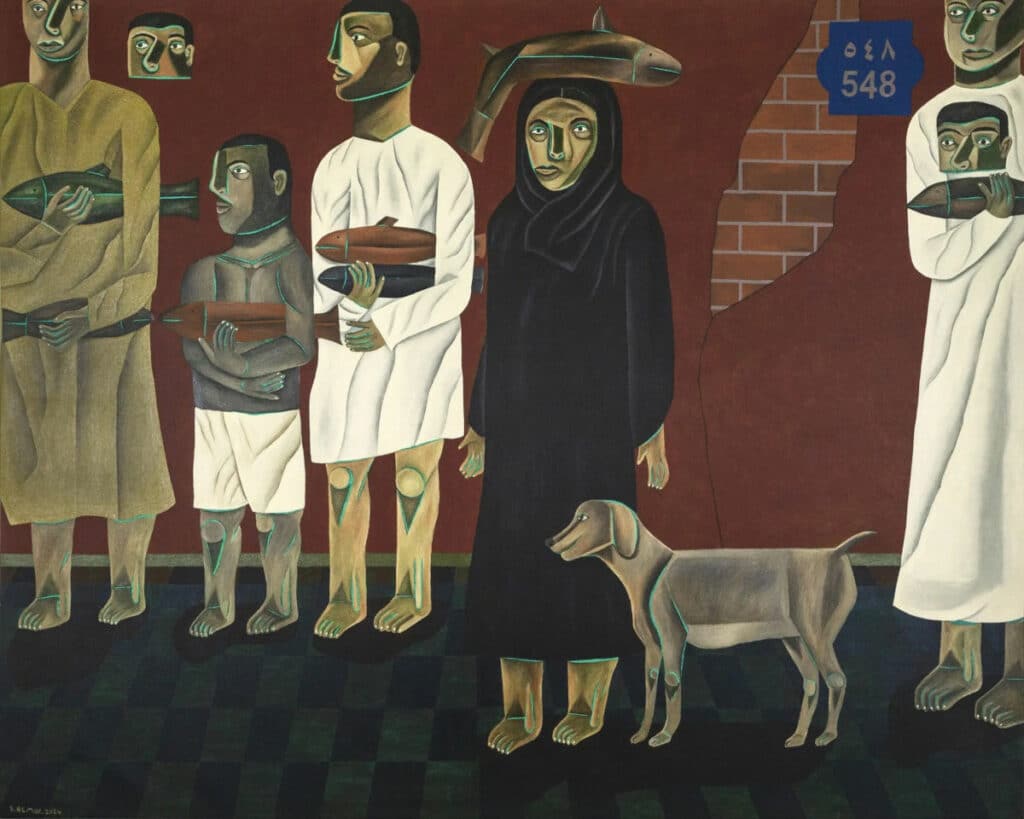
Salah Elmur (Sudan), The Road to the Fish Market, 2024.
These internal power struggles eventually boiled over into the 2023 civil war, an inevitable struggle that has all the hallmarks of a proxy war, with the SAF backed by Egypt and Saudi Arabia, the RSF backed by the United Arab Emirates, and other outside actors pulling strings behind the scenes. Talks continue here and there, but they are not moving forward at all. The war seems to have its own logic, with the SAF’s 300,000 troops unable to make major gains against 100,000 highly motivated RSF soldiers. Endless resources from gold sales and outside support could keep this war going on forever, or at least until most of the world forgets that it is taking place (like the forgotten wars in the Democratic Republic of the Congo and along Myanmar’s frontiers).
The United Nations keeps making statements as various human rights groups plead for further pressure on both the SAF and RSF. But nothing has been forthcoming. Even the peace talks are divided: the Emiratis and the Egyptians are brokering some in Cairo while the Saudis held others in Jeddah and the British decided to create yet others in London. It is not clear who is talking to whom and about what.
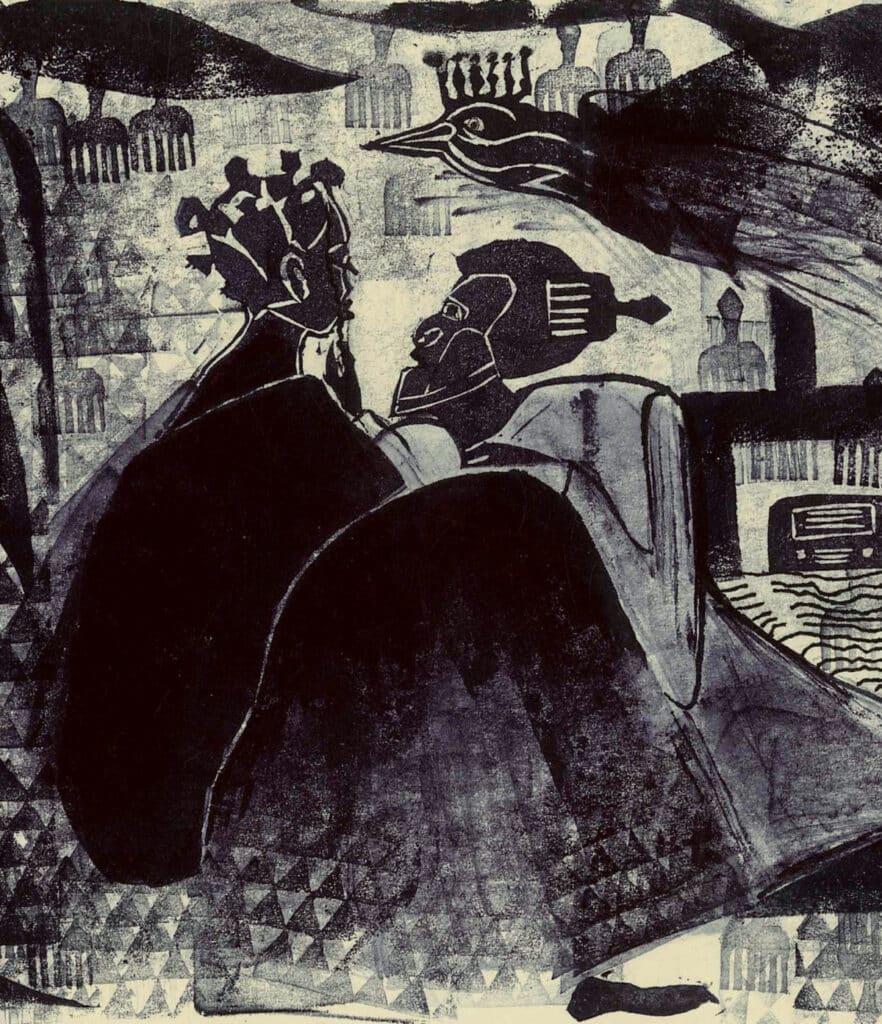
Amna Elhassan (Sudan), Hair and Love, 2019.
The most active attempt to broker a peace deal came from the African Union (AU) in January 2024 with the creation of the High-Level Panel for Sudan (HLP-Sudan). The panel is chaired by Dr. Mohamed Ibn Chambas, a Ghanian diplomat who was the African Union-United Nations special representative for Darfur and head of the AU-UN Hybrid Operation in Darfur (UNAMID) from 2012 to 2014. He knows both generals and is aware of the complexity of the situation in Sudan. The other two panel members are Dr. Specioza Wandira-Kazibwe, a former vice president of Uganda, and Ambassador Francisco Madeira of Mozambique, a former AU special representative to Somalia and head of the AU mission in that country. The HLP-Sudan is working with the Intergovernmental Authority on Development (IGAD)—East Africa’s regional body—to get the two sides to the table for a ceasefire agreement and then ultimately a deal.
Importantly, the HLP-Sudan met with a range of people from across the country’s political spectrum, including members of political parties, the military, and civil society groups. Many of them were signatories of the 2020 Juba Peace Agreement, which also included warring factions from Darfur, South Kordofan, and Blue Nile. But the negotiators face a problem amongst the civilian sections. In October 2023, deposed Prime Minister Abdalla Hamdok formed the Taqaddum (Progress) coalition, which brought civilian voices to the negotiating table. However, over the course of the past two years, dissention broke out over allegiances to one side or the other, and so in February 2025 it dissolved. Hamdok then formed a new group, Sumoud (Resilience), which wants to remain equidistant from both sides. In March, al-Hadi Idris, a former member of the Transitional Sovereignty Council, formed the Ta’sis (Founding Sudan) coalition, which then nominated Hemedti of the RSF as its leader. Even the civilian groups effectively broke along the lines of the civil war.
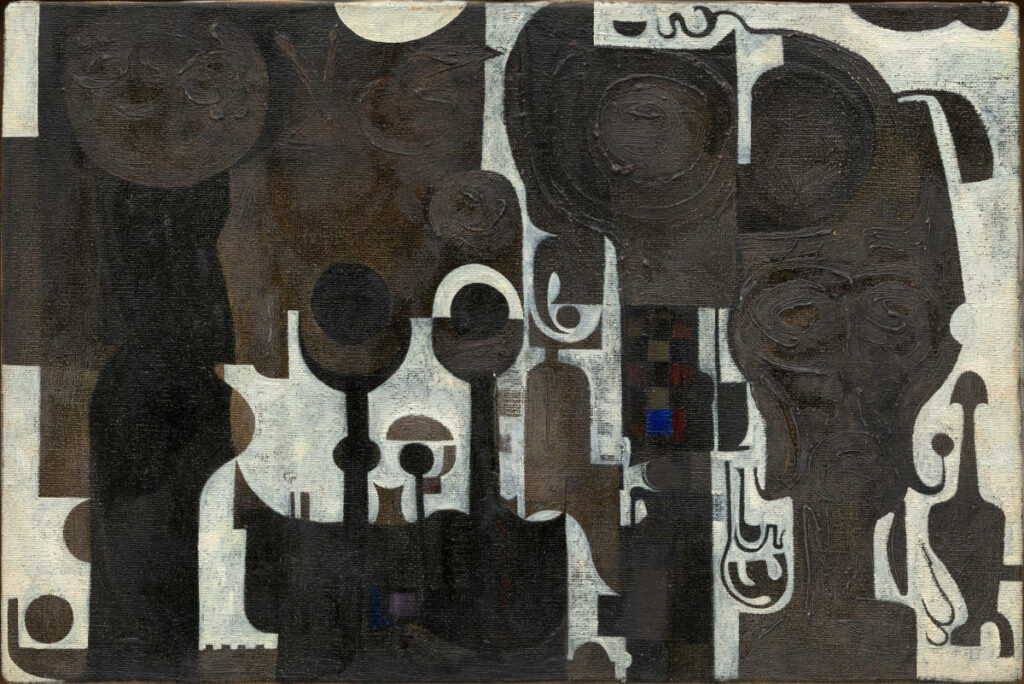
Ibrahim El-Salahi (Sudan), The Mosque, 1964.
Last year, I spoke with Hamdok, who seemed exhausted by the long war and the futility of the negotiations. Ever the impassive diplomat, Hamdok felt that wars can exhaust armies and force them to negotiate. He knows his history: Sudan won its independence from Britain and Egypt in 1956 but then entered its first civil war between the north and the south until it ended with the 1972 Addis Ababa Agreement; the decade of peace that followed (helped along by oil revenues from the south) is now a distant memory; a second civil war between north and south ran from 1983 to 2005, which resulted in the 2011 referendum that partitioned the country into Sudan and South Sudan; finally, a terrible conflict in Darfur began in 2003 and slowly came to a conclusion in 2010, eventually leading to the overthrow of Omar al-Bashir in 2019. At the time, the chant against al-Bashir was tisqut bas: ‘Just fall’. He fell. But the ground continues to shake.
Sudan’s people have not seen peace in generations. Hamdok’s hope is a hope against history, but for a future.
Warmly,
Vijay

